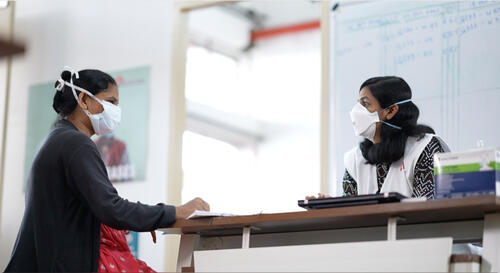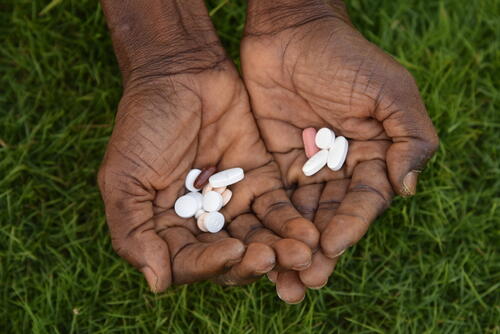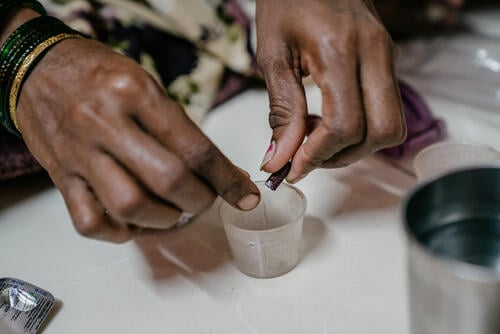- The results of the endTB clinical trial have found three new drug regimens to treat multidrug-resistant TB.
- The three regimens have shown similar efficacy and safety to standard treatments while reducing treatment time by up to two-thirds.
- Trial results show a fourth regimen could be used effectively for those who cannot tolerate one of two key drugs.
- If recommended by WHO, the new regimens would offer doctors shorter treatment choices for people in many key groups.
Paris – Clinical trial results presented for the first time today at the Union World Conference on Lung Health revealed evidence to support the use of four new, improved regimens to treat multi-drug resistant tuberculosis or rifampicin-resistant tuberculosis (MDR/RR-TB). The team – led by Médecins Sans Frontières (MSF), Partners In Health (PIH), and Interactive Research and Development (IRD) and funded by Unitaid – formed the endTB consortium and began this Phase III randomized controlled trial in 2017.
MDR/RR-TB is a disease caused by a TB bacterium that is resistant to rifampicin, one of the most powerful first-line antibiotics, plus/minus resistance to isoniazid. Roughly half a million people fall sick with MDR/RR-TB each year, and many die from it. Though a range of MDR-TB regimens are now in use around the world, many people are still treated with conventional treatments that are long (up to 24 months), ineffective (only 59 per cent treatment success in 2018), and often cause terrible side effects, including acute psychosis and permanent deafness. Patients on these regimens must ingest up to 14,000 pills over the full course of treatment, and some have to endure months of painful, daily injections.
The trial found three new drug regimens that can deliver similar efficacy and safety to conventional treatments while reducing treatment time by up to two-thirds. The endTB regimens represent important alternatives for short MDR-TB treatment and complement the use of another highly effective, shorter MDR-TB regimen, called BPaLM, which is not suitable for certain populations. If recommended by the World Health Organization, these new patient-centred treatment regimens would empower clinicians to offer shortened MDR-TB treatment regardless of age, pregnancy, and comorbidities that are common among people with MDR-TB.
Our results offer hope to those in dire need and underscore the urgency of continued research and innovation... to address diseases that too often strike the most vulnerable among us.Carole Mitnick, Partners In Health Director of Research for the endTB project
In addition, the trial supports the use of a fourth regimen as an alternative for people who cannot tolerate bedaquiline or linezolid; at least one of these two drugs is in every current World Health Organization-recommended regimen for MDR-TB.
The endTB trial enrolled a diverse group of 754 patients from seven countries (Georgia, India, Kazakhstan, Lesotho, Pakistan, Peru, and South Africa). This included historically excluded populations like adolescents and those with comorbidities like substance-use disorders, and retained participants who became pregnant during the trial. The trial evaluated five nine-month treatment regimens, and randomisation was outcome-adapted, meaning more patients were assigned to regimens that were producing better outcomes.
“We stand on the cusp of a significant breakthrough in the battle against MDR-TB, a disease that disproportionately affects impoverished populations around the globe,” said Carole Mitnick, ScD, Partners In Health Director of Research for the endTB project, Co-Principal Investigator of the study, and Professor of Global Health and Social Medicine at Harvard Medical School.
“Our results offer hope to those in dire need and underscore the urgency of continued research and innovation – and accountability of private companies that receive public funds – to address diseases that too often strike the most vulnerable among us,” said Mitnick. “But the cost of some drugs remains a barrier. One example is delamanid, which is still priced at 12-40 times higher than it should be according to an independently estimated cost to produce the drug.”
This marks a pivotal moment in the fight against a disease that has plagued vulnerable populations worldwide.Lorenzo Guglielmetti, Médecins Sans Frontières Director for the endTB project
“For far too long, MDR-TB has loomed as a formidable threat with limited, poorly tolerated treatment options, but today, we unveil evidence for multiple innovative all-oral, shortened regimens that will allow patient-centred, individualised treatment of MDR-TB,” said Lorenzo Guglielmetti, MD, Médecins Sans Frontières Director for the endTB project and Co-Principal Investigator of the study. “This marks a pivotal moment in the fight against a disease that has plagued vulnerable populations worldwide. What makes these results even more remarkable is the diversity, and resulting generalisability, of this Phase III randomized controlled trial.”
“These results provide new hope for all those awaiting treatment for the most dangerous and difficult to treat forms of tuberculosis worldwide,” said Dr Philippe Duneton, Executive Director of Unitaid. “We have the gold-standard research. The drugs are already available where they are needed. If recommended, this high-quality evidence could quickly translate into better treatment options suitable for all people with drug-resistant tuberculosis.”
The endTB clinical trial evaluated five experimental regimens for MDR/RR-TB against the standard of care in two distinct analysis populations. endTB regimens 1, 2, 3, demonstrated non-inferiority to the control in both primary analysis populations, establishing their success in treating RR-TB. Regimens 1, 2, and 3 achieved favourable outcomes in 89.0%, 90.4%, and 85.2% of participants, respectively. Regimen 5 also showed a strong treatment response at 85.6% and was non-inferior to the control’s 80.7% in one of the primary analysis populations. While consistent results in both populations are needed to formally establish non-inferiority, regimen 5 holds promise as an alternative for patients unable to receive other recommended treatments.
True access to these new treatment options depends on removing all barriers to timely and high-quality care. These trial results could address a major barrier to care for many people and the endTB consortium will continue to advocate to improve access and affordability to quality TB care.
To read more about the clinical trial results, please visit endTB.org.






